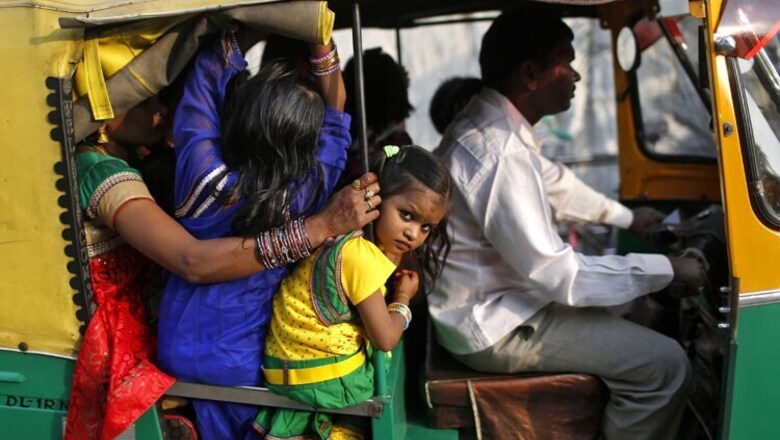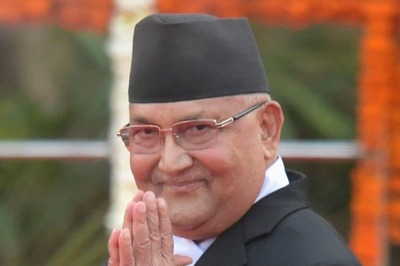
views
Road accidents are one of the biggest killers in India. Over 10 lakh people have been killed in road accidents in India in the last 10 years but the country is yet to have a stringent law on the issue.
The pertinent issue of death due to road accidents forced the government into action after the death of Union Cabinet minister Gopinath Munde on June 3, 2014. The death of a senior minister forced the Centre to act and a comprehensive road safety law was promised, but even a year on, all that has been observed are several missed deadlines and the law is yet to see the light of day.
While the initial drafts of the proposed Bill indicated government's seriousness in dealing with the issue of road accidents in India, there hasn't been any considerable progress in formulating the law lately.
Three timelines, all self-imposed by the government, to introduce the Bill have been missed. The government had promised to bring a stringent law within one month of Munde's demise. The timeline was later shifted to the Winter Session of Parliament and thereafter to the Budget Session. In the latest submission, there is a conspicuous silence on the deadline itself.
Comprehensive provisions for ensuring road safety, including establishment of the lead agency on road safety, reform of RTOs and the penalties system, stand compromised or diluted. This is reportedly the result of pressure from various influential lobbies including transport unions, automobile companies and state governments.
Transport Minister Nitin Gadkari had promised a comprehensive Bill that would address all major risk-factors which contribute to the high death toll on India's roads. Latest announcements by the government demonstrates that most provisions may be pushed into the ambit of rules, effectively taking away the force of law from them and making them prone to discretionary changes.
Road Transport & Safety Bill: A Timeline from June 2014 to Present
June 3, 2014: Gopinath Munde, Union Minister for Rural Development dies in a road crash in New Delhi
June 5, 2014: Nitin Gadkari, Union Minister of Road, Transport and Highways announces that a new legislation to replace the current Motor Vehicles Act, 1988 ("MVA") will be drafted in a month's time
August 19, 2014: "There are some outdated laws and systems, which need to be scrapped. Systems like RTOs will soon be abolished", says Gadkari
September 1, 2014: "A new Road Traffic Act will be brought in the winter session of Parliament, which will be at par with international Acts in the Road Sector…The draft of the proposed Act is already reaching final stage and it will include best practices of developed countries like USA, Canada, Singapore, Japan, Germany and the UK", says Gadkari
September 13, 2014: The first draft of the Road Transport and Safety Bill, 2014 ("RTSB") is released with comprehensive provisions on safety standards for road users, roads and vehicles, and management of road safety in India.
October 18, 2014: In a special TV program (follow up to Satyamev Jayate TV show's episode on Road Safety), Gadkari promises to include the provision for removal of liquor shops on Highways. He accepts that overwhelming public response to the episode had convinced him that the proposal of a stringent law was important towards ensuring road safety. He further admits that influential lobbies were unhappy with the strong proposals in the Bill. He reiterates that despite the pressures, reducing road accidents was a priority for the Prime Minister and himself.
October 28, 2014: While addressing the 15th Meeting of the National Road Safety Council and the 36th Meeting of the Transport Development Council, Gadkari says that RTSB is an initiative in the direction of multi-modal transport systems sensitive to the safety of users.
December 11, 2014: The second version of the draft RTSB is released
December 12, 2014: A national daily reports that Prime Minister has asked the Union Transport Minister to discuss all issues with all stakeholders before the final Bill reaches the Cabinet
2015
January 12, 2015: In a news channel interview, Shri. Gadkari says that the proposed RTSB will improve the state of Road Safety in India and ensure that no one gets a license through manipulation
January 19, 2015: The third version of the RTSB is released with rationalised penalties, and among other things, revision to the provisions on the creation and powers of the National Authority (the proposed lead agency for road safety)
February 5, 2015: At the meeting of the Consultative Committee of the Members of the Parliament, several States oppose the RTSB fearing that they would lose rights to the collection of road tax. They also criticise the establishment of the National Road Safety Authority of India, which according to them, encroaches upon transport – a State subject. In response, Shri. Gadkari declares that (i) the RTSB shall not encroach upon the rights of the State; (ii) the MoRTH will revise the proposed fines by almost one-fifth of what was originally envisaged.
February 20, 2015: The fourth version of the RTSB is released with significant dilution to various elements of the draft Bill.
• The provision for an independent selection committee for appointing the chairperson and members of the National Authority is dropped and the Central Government assumes sole responsibility for appointments to National Authority, taking away the independence in selection.
• Cap of Rs 15 lakh set for insurance claims towards death and disability caused by road accidents
• Fine for over-speeding is reduced from Rs. 15,000 to maximum of Rs. 2,000 for the first offence.
• Punishment for causing death of a child reduced from 7 years imprisonment to minimum 1 year, whereas the fine is reduced from Rs. 3 lakh to Rs. 50,000
• Penalty for driving without helmet reduced from Rs. 5,000 to Rs. 500.
• Penalty for failure to comply with standards for road design, construction & maintenance is reduced from Rs. 10 lakh per person killed to Rs. 1 lakh. No jail-terms prescribed for road contractors/engineers for causing death or injury.
• Despite earlier promises, provisions for ensuring removal of liquor shops from highways is missing
February 26, 2015: In response to Parliamentary Questions asked by Ch. Malla Reddy and Suresh Kodikunnil (Lok Sabha) about the time by which the Road Transport and Safety Bill is expected to be passed, the Minister of State ("MoS"), MoRTH replies that no definite timeframe can be given for the Bill to take the form of an Act.
March 31, 2015: At an event in Bengaluru, Shri. Gadkari says that the RTSB will be introduced in the Parliament when the Budget Session resumes in April third week
April 5, 2015: Road transporters, under the banner of various centrally affiliated federations and also those independently functioning call for a countrywide one day strike on April 30 to protest against the RTSB (Notice for strike served on April 17)
April 10, 2015: At the 21st South India Transport Council meeting, States express concerns against the RTSB and the powers proposed to be vested with the Central Government and National Transport Authority.
April 27, 2015: In a reply to a Parliamentary Question raised by Dr. K. D Singh in the Rajya Sabha, as to whether there is a Bill providing for stringent punishment for violation of traffic rules is in the process of enactment by Parliament, the MoS, MoRTH states that the punishments in the Bill will be finalised only after it is passed by the Parliament, effectively proposing a shift of safety elements to the rules.
April 29, 2015: In a PIB Press Release, Gadkari appeals to transport unions not to go on strike. The Press Release reports that:
• The power to decide on the actual quantum of fines will be put in rules
• The quantum of fine has been reduced from the amounts indicated in the earlier draft. Before any decision on the quantum will be spelt out, wider consultation with all stake holders will be held
• Permit for intra-State contract carriage to be continued to be vested in the State Transport Authority, under the State Governments. InterState Carriage permits will be issued by the National Transport Authority
In the next draft of the Bill, the Government is expected to assume powers to supersede notifications by the National Authority, thereby further diluting its authority.
April 30, 2015: Some State Road Transport Corporations, Trade Unions and Road transporters, under the banner of various centrally affiliated federations organise a nationwide bandh to protest against the strict penalties and provisions of RTSB. The strike is partially observed.
(The data has been compiled by SaveLIFE Foundation)


















Comments
0 comment